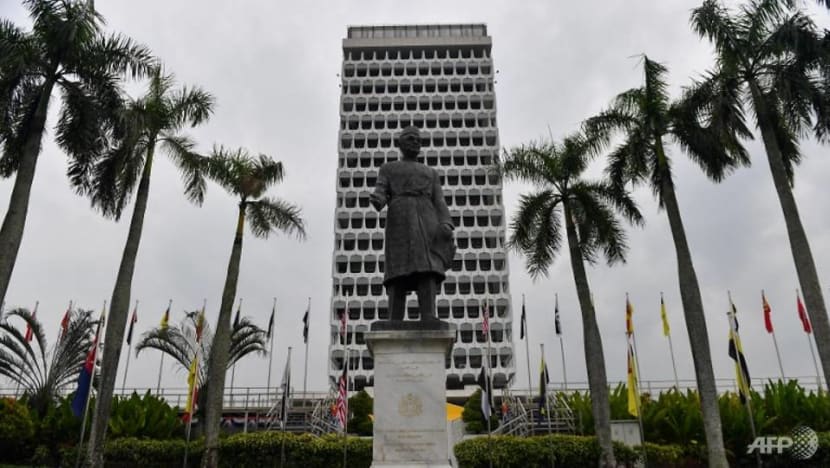commentary Commentary
Commentary: The Malaysian Chinese Association, set adrift in need of a direction
The Malaysian Chinese Association will have to decide its fate in its upcoming party elections – or risk waiting around for decades to become politically relevant again, says James Chin.

A Chinese-Malaysian resident of Bentong rides a bicycle past a row of flags of Barisan Nasional and the opposition Parti Keadilan Rakyat - the People's Justice Party. (Photo: Pichayada Promchertchoo)
TASMANIA: While the political class in Kuala Lumpur are keeping a close eye on the latest in the Parti Keadilan Rakyat internal party polls, an equally interesting party election is occurring in the Malaysian Chinese Association (MCA).
MCA is electing a new party president and the deputy president this Sunday after its dismal performance in the May polls. It only managed to win one seat in the 222-seat parliament.
We are talking about a party that was one of the original founders of the Malayan Alliance (MA), who negotiated Malayan independence from the British in 1957.
This election is crucial to the future of the MCA as it will lay the foundation for its political future. With only one seat in parliament, this party election is really about the political survival of the party.
READ: First hurdle down but not all smooth sailing for PM-in-waiting Anwar Ibrahim, a commentary
SINCE DAY ONE
The importance of MCA to Malaysia’s political history cannot be understated. Together with United Malays National Organisation (UMNO) and the Malaysian Indian Congress, under the leadership of Tunku Abdul Rahman, they formed the Malayan Alliance (MA). The MA was the platform chosen by the British to negotiate Malayan Independence.
From day one of Malaysia’s independence, MCA was the second most important party in the Alliance, and later the Barisan Nasional (BN). UMNO not only saw MCA as its Chinese partner but gave MCA a special status as one of the three original founders of the Alliance.
This closeness to UMNO was both MCA’s greatest strength and its greatest weakness.
For the past half century, the Chinese vote was, more or less, divided between the MCA and Democratic Action Party (DAP). Although most of the Chinese population supported the DAP in most elections, the MCA always managed to win a sizeable number of seats, due to its closeness to UMNO, access to government patronage and fear-mongering among the Chinese.

For the longest time, sections of the Chinese community bought the argument that some MCA candidates needed to be elected to ensure the “Chinese voice” was heard in cabinet to ensure a moderation of the Malay agenda pursued by UMNO.
Things would get a lot worse, as the argument goes, if UMNO pursued its Malay agenda and Islamisation policies without any internal opposition from MCA.
FALLING APART
The MCA model fell apart exactly a decade ago in the 2008 general election. The Chinese community concluded that after waiting half a century to be treated fairly by UMNO, UMNO will never accept the Malaysian Chinese as full citizens and supporting the MCA’s “Chinese voice” in government was fruitless and self-defeating.
The “Chinese voice” argument became even more hollow when the MCA refused to join the federal cabinet after the 2013 general election. The then UMNO-led Najib administration carried on as usual.
It became clear to all Chinese voters that the MCA’s absence in the government had no impact whatsoever.
The Chinese community decided that regime change was the only viable option and vote as a single bloc for the DAP. This was exactly what happened in 2008, 2013 and 2018 general elections. In the May 2018 elections, the DAP received 95 per cent of the Chinese vote in some urban constituencies.
THE CONTROVERSY: ASSOCIATION WITH THE BARISAN NASIONAL
In an ironic twist, UMNO, the cause of the MCA’s downfall due to its Malay agenda policies, is also the main topic in the upcoming MCA polls. The two contenders for the MCA presidency are arguing over the MCA’s membership in the BN coalition.
The first contender for the presidency, Wee Ka Siong, MCA’s sole elected Member of Parliament, argues that the full MCA membership must be consulted on its withdrawal.
The other contender, Gan Peng Siew, says he will withdraw the MCA from the BN immediately, echoing the widely held view that the BN brand under UMNO is toxic to the Chinese community.

The debate over the MCA’s membership in the BN coalition obscures the real issue facing MCA. The real issue facing the MCA today is simply this: What is the MCA’s value proposition to Chinese Malaysians, the group it seeks to represent?
From its formation in 1949 to the mid-1980s, every Malaysian Chinese understood what the MCA stood for. The MCA was there to promote Chinese business interest and act as the “Chinese voice” in a Malay government led by UMNO.
When UMNO became aggressive with its Malay agenda under the first Mahathir administration, the value proposition of the MCA changed drastically.
WANTED: A NEW VALUE PROPOSITION
By the early 1990s, the MCA was widely seen by the Chinese community as a “welfare” or “charity” outpost, rather than a political party.
The MCA, knowing that it had no political power, began to diversify away from politics to entrench itself among the Chinese community. It established a university and businesses to support the Chinese community. It also funded many “service centres” that provide welfare assistance to urban dwellers.
In recent times, the MCA even set up a Belt-Road Initiative (BRI) unit within the party to promote Chinese business participate in the BRI. The MCA was not sort of money; its assets are worth around RM2 billion (US$480 million).
Whoever wins the MCA presidency this Sunday must thus come up with a new value proposition for the MCA. The MCA cannot be a “welfare” party anymore.
Even as a political party, MCA will have problems identifying its base. The Chinese community in Malaysia has already decided, as a block, to throw their support behind the DAP. The MCA cannot claim to speak for the Chinese politically.
There are no easy answers politically and it may be that the MCA’s future lies in simply waiting; waiting for the DAP to falter. If that is the case, it may have to wait for decades.
Professor James Chin is director of the Asia Institute at the University of Tasmania and senior fellow at the Jeffrey Cheah Institute on Southeast Asia.














